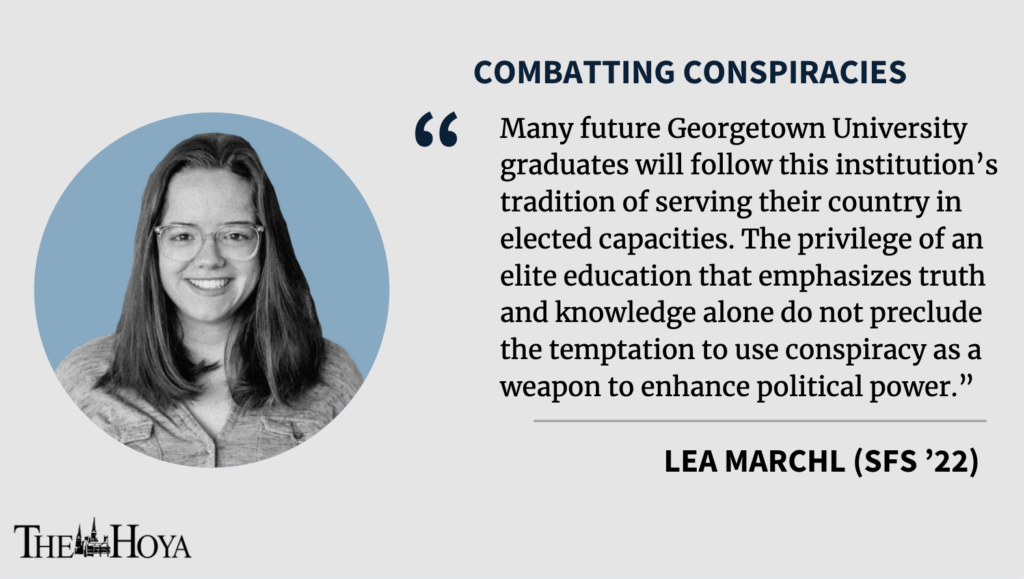Throughout history, autocratic figures have often used conspiracy theories to maintain power and control over their country’s population.
In the past, autocrats proliferated these theories to support their existing ideologies. However, modern-day autocrats have replaced ideology with conspiracy theories rooted in misinformation, hoping to mold their citizens’ worldviews and weaken esteem for truth in order to accrue more power.
Learning how contemporary propaganda operates is the crucial first step in understanding why conspiracy theories are a key tool for modern autocrats. In the 20th century, despots worked hard to convince populations of a certain reality they labeled as the truth by writing fake articles, altering images and reinventing histories. These distorted realities helped dictators buttress existing ideology and justify genocidal policies.
Now, in the age of information abundance, authoritarians such as President Vladimir Putin deploy mass amounts of information to create confusion and mistrust among the population rather than sway them toward a political ideology. Propaganda, both in content and promotion technique, is no longer about promoting an alternate reality but rather about denying the intrinsic value of truth.
The internet has allowed unprecedented quantities of information, both valid and misleading, to circulate in the marketplace of ideas. This transfer of information can become so overwhelming and disorienting that many find it easier to follow the loudest voice in the room, regardless of whether it spews lies or reality. As such, modern autocratic figures like President Rodrigo Duterte of the Philippines continue to be successful in promoting their chosen ideologies because of, not in spite of, their ability to disseminate the most outrageous propositions.
Conspiracy theories play a significant role in this new form of propaganda. The 21st century media environment is as complex as it has ever been, and citizens have a hard time explaining world events with so many sources to synthesize. Modern day autocrats offer catchall, sensationalist theories to populations enthusiastic to receive them because citizens are more inclined to accept a narrative peddled by a strong figure than navigate conflicting information themselves.
In Russia, President Vladimir Putin paints the world in a rotten, cynical light by belaboring the message that the Western world, led by the United States, is conspiring against Russian success. In Hungary, Prime Minister Victor Orbán has pitted his people against the financier George Soros, amplifying antisemitic theories that Soros is plotting the downfall of the nation. Orban has been successful in closing universities, passing laws allowing him to rule by decree and weakening the free press.
The United States is not immune to these theories. Former President Trump was prolific for amplifying a variety of conspiracy theories, ranging from claims that former President Obama was spying on his campaign to the claim that Dominion Voting Systems systematically flipped votes in the 2020 election. He also never formally rejected the QAnon worldview and often retweeted accounts claiming that an elite cabal is embedded in the U.S. elite and that Trump was anointed by God to save the country from it.
The cynicism these autocratic leaders have fostered allows them to navigate the difficulties of censorship in the age of information abundance. Autocrats in the 20th century had a relatively easier time controlling the flow of information coming in and out of their countries, a privilege no longer available now that the internet is so widely accessible. Rather than suppressing one source only for another to pop up, leaders like President Putin have adopted a technique labeled “white jamming” by Russian media analyst Vasily Gatov. Putin characterizes any source contradicting his worldview that global forces are after Russia as part of that very conspiracy. With white jamming, Putin has cultivated a mental block that lowered Russian citizens’ approval of the U.S. from 60% to just 15% in just over a decade.
Modern autocrats have been successful in displaying the world in the black-and-white terms of their conspiracy theories, allowing them to present a dark world only they can commandeer. In the United States, the most poignant example is the astounding number of baseless conspiracy theories that President Trump and his political allies spread during the presidential election season, which led to the deadly insurrection at the Capitol. To this day, a third of Americans believe the election was stolen, proving that a barrage of lies, no matter how outlandish, will have a devastating impact on Americans’ trust in our most basic freedom: the right to a fair and free election. This situation is dangerously exploitable by future aspiring autocrats.
Many future Georgetown University graduates will follow this institution’s tradition of serving their country in elected capacities. The privilege of an elite education that emphasizes truth and knowledge alone do not preclude the temptation to use conspiracy as a weapon to enhance political power. After all, two of the loudest amplifiers of election-related conspiracy theories on Capitol Hill, Sens. Josh Hawley (R-Mo.) and Ted Cruz (R-Texas), received multiple degrees from elite universities.
Further, former President Trump’s recent acquittal demonstrates that there are no serious political consequences to spreading conspiracy theories in the interest of autocratically subverting elections. The U.S. Senate’s decision gives the green light to future politicians, some of them Georgetown graduates, to further push the limits of our institutions, perhaps dealing a fatal blow to democracy. As Georgetown students, we must continue to fight conspiratorial thinking by promoting democratic values like fact-based discourse and rejecting power grabs based on lies and conspiracy theories.
Lea Marchl is a junior in the School of Foreign Service. Combatting Conspiracies appears online every other Friday.










IlluminatedAlum • Feb 27, 2021 at 1:44 pm
Ummm, it was proven that Trump’s campaign was spied on by the competition. It goes both ways, buddy.